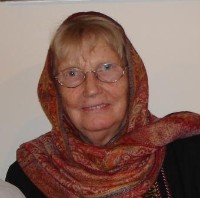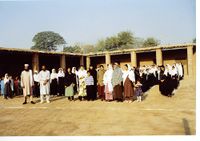Ursula Nölle 1924 - 2019
Ulla Nölle, as she was known by most, grew up in Kirchsteinbek near Hamburg. After the war, she re-joined school (which had been interrupted due to the war) and met her husband. After graduation she started to study biology. She, her husband and two children migrated to the USD in the 1950s. They were happy there, but missed their home country and returned to Hamburg after 8 years: the four plus the US-born twins. In Germany, the 5th child was born. In the 1960s the family moved to Oststeinbek near Hamburg. Ulla Nölle joined the Sports Club TuS Gut Heil where she taught physical exercises in many mother & child groups. The Senate of Hamburg awarded a special medal for her efforts in starting this new idea.
In 1983, her daughter Christine received a scholarship to the University of Lahore in Pakistan. She wanted to show her sister Karen and her mother the country and asked them for a visit. Christine was especially fascinated by Afghanistan. During their tour through Pakistan they arrived in Peshawar where many people lived in poor refugee camps after having fled Afghanistan after the invasion of the Soviet troops in 1979. Karen Nölle remembered this trip in the Jubilee Paper of 2004:
Our committee would not exist if there had not been my sister Christine. Because of her enthusiasm for Asia, our mother visited Pakistan in 1983. Up to then, Ulla had always worried when Tine travelled every year: Long periods without any news from her, civil unrest in the areas she visited, health problems - as a mother she was not feeling at ease although Tine's travel reports were always fascinating. And then Tine got a scholarship for Lahore. She was planning to stay for a longer period and was living in proper accommodation so that the two of us had the idea to plan a trip together with our mother. We wanted to give her a positive impression of Asia. And also it was one of the rare opportunities that the three women of the family could spend lots of time together.
In March 1983 we started our journey. We flew to Delhi, stayed overnight in the tropically hot airport with lots of tea sellers and beggars, continued to Amritsar and crossed the border to Lahore where Tine was awaiting us. Already during this first taxi ride passing water buffalos and white herons, Ulla's early qualms which she had on arrival at the airport in Delhi changed to open curiosity. In Lahore Tine showed us around the old town and the areas with big modern houses of the newly-rich, we met musicians, visited tea houses and walked through the bazars. We travelled to Rawalpindi in an air conditioned bus for tourists and stayed in a hotel from colonial times where at breakfast the next morning Ulla looked at us and asked the question: "And how do you travel normally?".
From then on we went on public buses for which we had to pay only a few rupees for journeys lasting hours. However, sometimes the roofs were leaking and our luggage looked worse from day to day. We stayed overnight in a youth hostel sleeping on simple "chahar poys" lovingly looked after by the lady who was running the hostel. In Swat Valley Ulla needed a break from her daughters. She sent us back to the entry of the valley to exchange some money while she joined a group of tourists who were travelling up the mountain. While we were sitting in the hostel looking at the lonely third cup of tea and getting odd looks from the people working there, who probably assumed that we had pushed our mother off the mountain, our mother was obviously enjoying the mountain scenery: She returned to the hostel in a happy mood.
The further we moved west, the more we saw camps for some of the millions of Afghan refugees who had fled their home country after the invasion of the soviet troops three years before. In Peshawar my sister knew some people who worked for NGOs and who offered to let us stay with them for a few days. They also offered to take us to the camps. We rejected their offer at first because we felt as tourists we would be out of place in the camps but in the end we agreed to visit a school for refugees about which we had heard so much.
The young teacher herself had left Jalalabad and was, as we learned later, only 21 years old. She had started a school in the house her parents had rented. She wanted to bring some positive changes to the lives of the refugee girls - just for some hours she wanted to rescue them from the life in the camp. Within a very short time the number of students had risen to 130. The young lady did not have any funds to keep going. The project was near to closure.
Ulla could not forget about this problem. We visited the school several times to watch the lessons and talk to the teachers, and then we also visited the camp. We were deeply impressed by the pride and the generosity of the ladies in the camp who invited us to tea and bread when we stopped to talk to them for a few minutes. After some days of trying to understand the problems of living in the camp, Ulla said in the school: "I will try to help you".
This was the starting point for her future commitment.
Ulla lost no time. On her return flight to Europe going from Munich to Northern Germany she told the woman in the seat next to her about this school for Afghan girls in Peshawar and was given the first 100 Deutsche Mark. Back at home Ulla Nölle talked to her friends and everyone else who was prepared to listen to her. Many people were ready to help.
With a group of friends and family the committe in the name of Verein zur Unterstützung von Schulen für afghanische Flüchtlingskinder e.V. was started. After a while this long name was abbreviated to VUSAF. This is how the committee is now known in Afghanistan.
Again and again Ulla Nölle flew to Pakistan. In 1986, the first school of the association was started. The construction of one room cost 2000 DM. In the following year another room was needed, more children joined.
By 2002, the committee had established 7 schools for 3,500 children in the refugee camps of Pakistan. Most of the people have meanwhile returned to Afghanistan. We supported some teachers and students from three schools to settle in Mazar-e-Sharif, where we helped them with the construction of a new school. Another camp school found new supporters. The others were dissolved.
After the withdrawal of the Soviet troops in 1988, the committe supported a school in northern Afghanistan. Others also needed support. At the beginning of the 1990s, Ulla Nölle and her daughter visited the schools near Andkhoi. At that time, there was optimism, however, after a while civil war took its course. At the end of 1998, the only girls' school had to close. Together with these teachers (below) we set up so-called home schools. In the private homes of these teachers, 800 to 900 girls were taught until the end of 2001.
Andkhoi and the surrounding villages became Ulla Nölle's second home.
The people here called her Mama or Grandmother.
She was the "Savior in Greatest Need" after people did not even have the bare necessities to live on. Ulla Nölle and her colleagues had exchanged German Marks to USD-Dollars in Pakistans before moving on to Afghanistan and tied them around their bodies. In Andkhoi, the teachers received 100$ each. That was her rescue in difficult times.
Many, many times Ulla Nölle travelled to Andkhoi. Sometimes once, sometimes twice a year, accompanied by members of the committee who were all also actively involved in the work.
In 2003 Ulla Nölle became honorary principal of the commitee. She continued to work actively with the board and represented the commitee on the radio and on television. She gave interviews for newspapers and magazines.
She gave presentations about the work of the committee to interested groups of people, including schools. She was particularly involved in the Gymnasium in Neubiberg. This school was especially successful in organizing events to raise funds for Afghanistan. Ulla Nölle was able to inspire the students, but also the teachers and school management for the educational projects in Afghanistan.
In 1999 and 2006 Ulla Nölle was honoured by the President of the Federal Republic of Germany. In 2006 the received the Medal of Merits 1st Class.
In 2007 she was "Women of the Year" (honoured by Clarins and Mona Lisa).
During her last trip to Mazar-e-Sharif and Andkhoi which was in 2015.
During a heart valve operation the following year, Ulla Nölle suffered a stroke. With an iron will, she worked to get fit again. A setback came when she broke a leg. Again she tried to get well because she wanted to travel to Andkhoi again. On 5.9.2019 her heart became weak. On 7.9.2019 she could say goodbye to some of the many children / grandchildren. On 8.9.2019 she did not wake up again. We will not forget her.pecially successful in organizing events to raise funds for Afghanistan. Ulla Nölle was able to inspire the students, but also the teachers and school management for the educational projects in Afghanistan.
In 1999 and 2006 Ulla Nölle was honoured by the President of the Federal Republic of Germany. In 2006 the received the Medal of Merits 1st Class.
In 2007 she was "Women of the Year" (honoured by Clarins and Mona Lisa).
During a heart valve operation the following year, Ulla Nölle suffered a stroke. With an iron will, she worked to get fit again. A setback came when she broke a leg. Again she tried to get well because she wanted to travel to Andkhoi again. On 5.9.2019 her heart became weak.
On 7.9.2019 she could say goodbye to some of the many children / grandchildren. On 8.9.2019 she did not wake up again. We will not forget her


